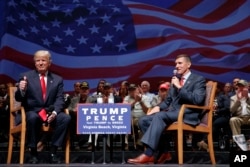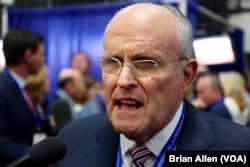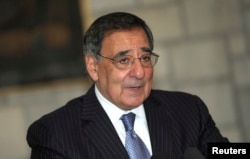Even as the transition team for U.S. President-elect Donald Trump works to assemble his Cabinet, a consensus is emerging on what the world may be able to expect from the new administration on counterterror policy.
The view, from longtime Washington veterans and from those close to members of the transition team, is one of an administration likely to place a premium on innovation and the selective but convincing use of force. And it will put America's interests above all else.
The approach, in some ways, is intended as a rebuke to the administration of President Barack Obama as well as that of his predecessor, President George W. Bush. One is seen as too timid and the other as overly aggressive on the international stage.
"You're going to see a lot more resolve," said Tony Shaffer, a retired intelligence officer and vice president of Strategic Initiatives and Operations at the London Center for Policy Research.
Shaffer, who has worked with retired Lieutenant General Michael Flynn, a key Trump military adviser, believes that resolve will be most evident in the Trump administration's approach to counterterrorism, specifically in the fight against the Islamic State terror group.
"One of the first things that will be fixed is the fact that the Pentagon has sought and was denied more authority to approach ISIS on a global basis," he said, using an acronym for the terror group. "I'm sure the Pentagon is going to get that authority in the new Trump administration."
Interests over values
Still, Trump supporters emphasize the new administration will also be pragmatic, and the desire to remove restrictions on the Pentagon and U.S. intelligence agencies does not mean scrapping efforts that have gotten results.
Counterterrorism efforts "will simply be accelerated," said Michael Pregent, a former intelligence officer now with the Hudson Institute. "It will be done more often. It will be empowered to succeed."
Some Washington insiders say that in some ways, what Trump has in mind may not actually be all that different from what the world saw from Obama.
"There will be some adjustments, maybe most of them rhetorical," said P.J. Crowley, a former State Department official in the Obama administration. "Somewhat like the Obama administration, there's going to be greater caution in terms of where and how the United States intervenes directly."
But Crowley told VOA's Press Conference USA he also expects the incoming Trump administration will be "much more focused on American interests, probably a little less focused on American values."
"We're not necessarily going to worry about the character of our allies," he said. "We're going to worry about what they can do to solve a problem."
Yet how these likely changes will actually affect U.S. counterterror allies is less clear.
"We just have to wait and see, because really nobody knows," Najmaldin Karim, the governor of Iraq's Kirkuk province, said Tuesday during a visit to Washington.
"He's a smart guy," he added. "I think the campaign rhetoric is different than the reality."
Reasons for worry
Yet, Trump critics see plenty of reason to worry, highlighted by comments of Trump supporter and former New York City Mayor Rudy Giuliani, said to be a possible candidate for U.S. secretary of state.
Giuliani on Monday portrayed IS not just as a key counterterrorism priority but as the incoming administration's top foreign policy priority, ahead of other Middle East issues, like the Iran nuclear deal.
"ISIS, short term, I believe, is the greatest danger and not because ISIS is in Iraq and in Syria," Giuliani told The Wall Street Journal CEO Council. "ISIS did something al-Qaida never did — ISIS was able to spread itself around the world."
"I don't believe the Trump administration can look beyond ISIS," said Malcolm Nance, a former counterterrorism and intelligence officer who now heads the Terror Asymmetrics Project. "Trump sees the jihadi threat as equal to the entire Muslim world. They have bought into the clash-of-civilizations myth created by [al-Qaida founder] Osama bin Laden."
Nance and others fear that a single-minded focus on IS, combined with Trump's rhetoric on Muslims from his presidential campaign, could backfire within a year.
"The Muslim street will lose all faith in the United States as a fair arbiter in the Middle East," Nance cautioned. "This will lead to the salvation of ISIS and escalate the flow of new foreign fighters back to the 2014 levels."
Reasons for hope
Still, there are veteran Washington power brokers who see positive signs from the president-elect, including Leon Panetta, a former defense secretary and CIA director.
"He's beginning to understand, again, the responsibilities that are part of that office," Panetta said Tuesday at a panel sponsored by the Center for Strategic and International Studies, noting Trump's cautious approach to using military power.
Still, Panetta cautioned that alone would not be enough to defeat IS and other terror groups.
"If you're going to be careful about how you use military power, you also have to be aggressive about how you address the root causes of dealing with terrorism," he said.
Those with insight into the way Trump's advisers and transition team are thinking say they have a desire for some debate and discussion, with the goal of devising a more cohesive and reasoned approach to counterterrorism policy.
"I'd like to think you're going to see much more of a chess game approach to things," said Shaffer, the retired military intelligence officer and colleague of the president-elect's key military adviser. "We don't want to be the one showing up with 100,000 men every five years to fix things."







